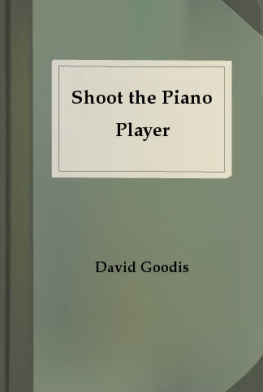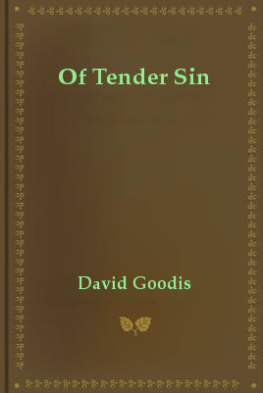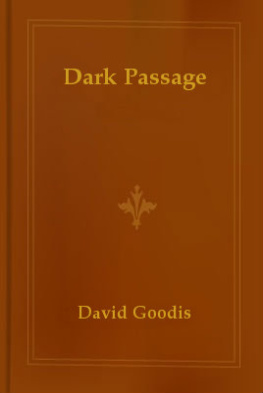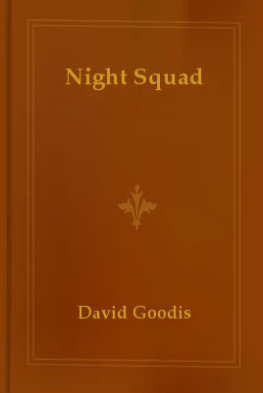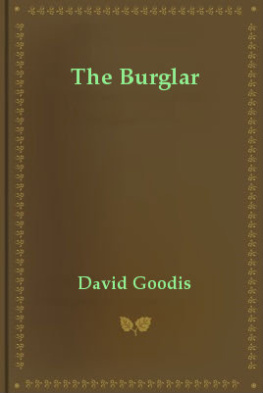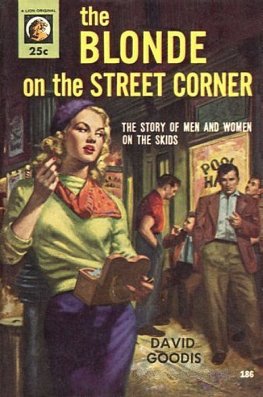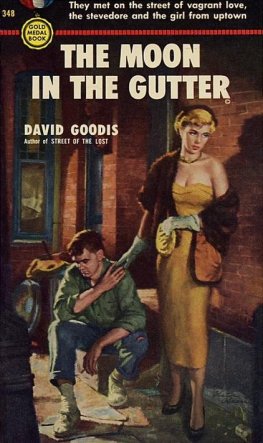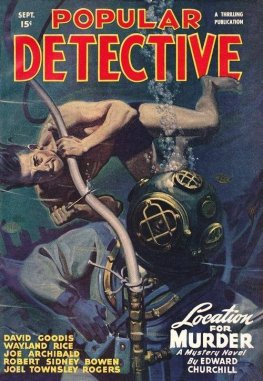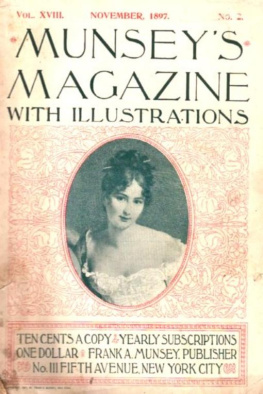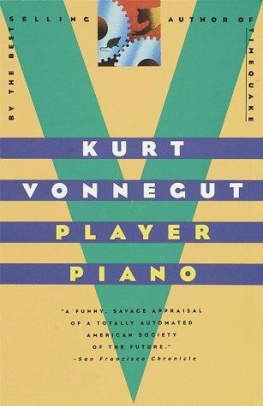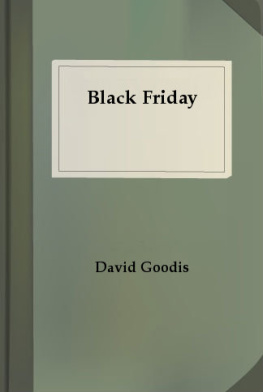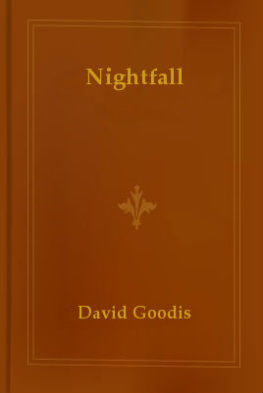David Goodis - Shoot the Piano Player
Here you can read online David Goodis - Shoot the Piano Player full text of the book (entire story) in english for free. Download pdf and epub, get meaning, cover and reviews about this ebook. year: 1990, publisher: Vintage, genre: Detective and thriller. Description of the work, (preface) as well as reviews are available. Best literature library LitArk.com created for fans of good reading and offers a wide selection of genres:
Romance novel
Science fiction
Adventure
Detective
Science
History
Home and family
Prose
Art
Politics
Computer
Non-fiction
Religion
Business
Children
Humor
Choose a favorite category and find really read worthwhile books. Enjoy immersion in the world of imagination, feel the emotions of the characters or learn something new for yourself, make an fascinating discovery.
- Book:Shoot the Piano Player
- Author:
- Publisher:Vintage
- Genre:
- Year:1990
- Rating:5 / 5
- Favourites:Add to favourites
- Your mark:
- 100
- 1
- 2
- 3
- 4
- 5
Shoot the Piano Player: summary, description and annotation
We offer to read an annotation, description, summary or preface (depends on what the author of the book "Shoot the Piano Player" wrote himself). If you haven't found the necessary information about the book — write in the comments, we will try to find it.
Shoot the Piano Player — read online for free the complete book (whole text) full work
Below is the text of the book, divided by pages. System saving the place of the last page read, allows you to conveniently read the book "Shoot the Piano Player" online for free, without having to search again every time where you left off. Put a bookmark, and you can go to the page where you finished reading at any time.
Font size:
Interval:
Bookmark:
by David Goodis
Copyright 1956 by Fawcett Publications,Inc.
Copyright renewed 1984 by the Estate ofDavid Goodis.
First Vintage Crime / Black LizardEdition, October 1990
All rights reserved under Internationaland Pan-American Copyright Conventions. Published in the UnitedStates by Vintage Books, a division of Random House, Inc., NewYork, and distributed in Canada by Random House of Canada Limited,Toronto. Originally published as _Down There_ by FawcettPublications, Inc. in 1956.
shoot the piano player
There were no street lamps, no lights atall. It was a narrow street in the Port Richmond section ofPhiladelphia. From the nearby Delaware a cold wind came lancing in,telling all alley cats they'd better find a heated cellar. The lateNovember gusts rattled against midnight-darkened windows, andstabbed at the eyes of the fallen man in the street.
The man was kneeling near the curb,breathing hard and spitting blood and wondering seriously if hisskull was frachired. He'd been running blindly, his head down, soof course he hadn't seen the telephone pole. He'd crashed into itface first, bounced away and hit the cobblestones and wanted tocall it a night.
But you can't do that, he told himself.You gotta get up and keep running.
He got up slowly, dizzily. There was a biglump on the left side of his head, his left eye and cheekbone weresomewhat swollen, and the inside of his cheek was bleeding wherehe'd bitten it when he'd hit the pole. He thought of what his facemust look like, and he managed to grin, saying to himself, You'redoing fine, jim. You're really in great shape. But I think you'llmake it, he decided, and then he was runfling again, suddenlyrunning very fast as the headlights rounded a corner, the carpicking up speed, the engine noise closing in on him.
The beam of the headlights showed him theentrance to an alley. He veered, went shooting into the alley, wentdown the alley and came out on another narrow street.
Maybe this is it, he thought. Maybe thisis the street you want. No, your luck is running good but not thatgood, I think you'll hafta do more running before you find thatstreet, before you see that lit-up sign, that drinking joint whereEddie works, that place called Harriet's Hut.
The man kept running. At the end of theblock he turned, went on to the next street, peering through thedarkness for any hint of the lit-up sign. You gotta get there, hetold himself. You gotta get to Eddie before they get to you. But Iwish I knew this neighborhood better. I wish it wasn't so cold anddark around here, it sure ain't no night for traveling on foot.Especially when you're running, he added. When you're running awayfrom a very fast Buick with two professionals in it, two high-gradeoperators, really experts in their line.
He came to another intersection, lookeddown the street, and at the end of the street, there it was, theorange glow, the lit-up sign of the tavern on the corner. The signwas very old, separate bulbs instead of neon tubes. Some of thebulbs were missing, the letters unreadable. But enough of itremained so that any wanderer could see it was a place fordrinking. It was Harriet's Hut.
The man moved slowly now, more or lessstaggering as he headed toward the saloon. His head was throbbing,his windslashed lungs were either frozen or on fire, he wasn'tquite sure what it felt like. And worst of all, his legs were heavyand getting heavier, his knees were giving way. But he staggeredon, closer, to the lit-up sign, and closer yet, and finally he wasat the side entrance.
He opened the door and walked intoHarriet's Hut. It was a fairly large place, high-ceilinged, and itwas at least thirty years behind the times. There was no juke box,no television set. In places the wallpaper was loose and some of itwas ripped away. The chairs and tables had lost their varnish, andthe brass of the bar-rail had no shine at all. Above the mirrorbehind the bar there was a faded and partially torn photograph of avery young aviator wearing his helmet and smiling up at the sky.The photograph was captioned "Lucky Lindy' Near it there wasanother photograph that showed Dempsey crouched and moving in on acalm and technical Tunney. On the wall adjacent to the left side ofthe bar there was a framed painting of Kendrick, who'd been mayorof Philadelphia during the Sesqui-Centennial.
At the bar the Friday night crowd wasjammed three-andfour-deep. Most of the drinkers wore work pants andheavy-soled work shoes. Some were very old, sitting in groups atthe tables, their hair white and their faces wrinkled. But theirhands didn't tremble as they lifted beer mugs and shot glasses.They could still lift a drink as well as any Hut regular, and theyheld their alcohol with a certain straight-seated dignity that gavethem the appearance of venerable elders at a townmeeting.
The place was really packed. All thetables were taken, and there wasn't a single empty chair for aleg-weary newcomer.
But the leg-weary man wasn't looking for achair. He was looking for the piano. He could hear the music comingfrom the piano, but he couldn't see the instrument. A viewblurringfog of tobacco smoke and liquor fumes made everything vague, almostopaque. Or maybe it's me, he thought. Maybe I'm just about done in,and ready to keel over.
He moved. He went staggering past thetables, headed in the direction of the piano music. Nobody paid anyattention to him, not even when he stumbled and went down. Attwelve-twenty on a Friday night most patrons of Harriet's Hut wereeither booze-happy or booze-groggy. They were Port Richmond millworkers who'd labored hard all week. They came here to drink anddrink some more, to forget all serious business, to ignore each andevery problem of the too-real too-dry world beyond the walls of theHut. They didn't even see the man who was pulling himself up veryslowly from the sawdust on the floor, standing there with hisbruised face and bleeding mouth, grinning and mumbling, "1 can hearthe music, all right. But where's the goddam piano?"
Then he was staggering again, bumping intoa pile of high-stacked beer cases set up against a wall. It formeda sort of pyramid, and he groped his way along it, his handsfeeling the cardboard of the beer cases until finally there was nomore cardboard and he almost went down again. What kept him on hisfeet was the sight of the piano, specifically the sight of thepianist who sat there on the circular stool, slightly bent over,aiming a dim and faraway smile at nothing in particular.
The bruised-faced, leg-weary man, who wasfairly tall and very wide across the shoulders and had a thick mopof ruffled yellow hair, moved closer to the piano. He came upbehind the musician and put a hand on his shoulder and said,"Hello, Eddie."
There was no response from the musician,not even a twitch of the shoulder on which the man's heavy handapplied more pressure. And the man thought, Like he's far away, hedon't even feel it, he's all the way out there with his music, it'sa crying shame you gotta bring him in, but that's the way it is,you got no choice.
"Eddie." the man said, louder now. "It'sme, Eddie."
The music went on, the rhythm unbroken. Itwas a soft, easygoing rhythm, somewhat plaintive and dreamy, astream of pleasant sound that seemed to be saying, Nothingmatters.
"It's me," the man said, shaking themusician's shoulder. "It's Turley. Your brother Turley."
The musician went on making the music.Turley sighed and shook his head slowly. He thought, You can'treach this one. It's like he's in a cloud and nothing moveshim.
But then the tune was ended. The musicianturned slowly and looked at the man and said, "Hello,Turley."
"You're sure a cool proposition," Turleysaid. "You ain't seen me for six-seven years. You look at me as ifI just came back from a walk around the block."
"You bump into something?" the musicianinquired mildly, scanning the bruised face, the bloodstainedmouth.
Font size:
Interval:
Bookmark:
Similar books «Shoot the Piano Player»
Look at similar books to Shoot the Piano Player. We have selected literature similar in name and meaning in the hope of providing readers with more options to find new, interesting, not yet read works.
Discussion, reviews of the book Shoot the Piano Player and just readers' own opinions. Leave your comments, write what you think about the work, its meaning or the main characters. Specify what exactly you liked and what you didn't like, and why you think so.

